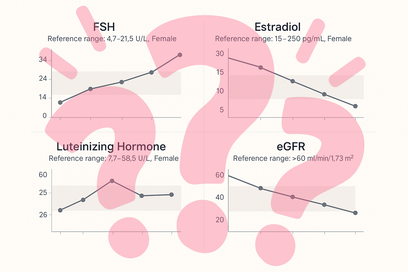When I first started feeling “off” — the weight gain, the night sweats, the brain fog, the fatigue — I thought I’d just need a quick tweak to my workouts or diet. But the truth? My body wasn’t just whispering, it was practically screaming for me to look deeper.
That’s where bloodwork comes in.
Blood panels are more than a bunch of numbers your doctor glances at before saying, “You’re fine.” They’re a roadmap — if you know what to look for.
The Signs That Sent Me to the Lab
For me, it was:
- Unexpected weight gain (15 pounds in under 6 months)
- Cellulite showing up where it never had before
- Miserable night sweats and sudden hot flashes
- Lower energy levels
- Mood shifts — from “fine” to “set me off with one wrong word” in record time
If you’re experiencing symptoms that feel out of the ordinary for you, that’s your cue to get labs done.
The Most Telling Midlife Labs
While every case is unique, these are often the key markers for women in midlife:
- FSH (Follicle-Stimulating Hormone) – High levels (often over 30) can indicate menopause or perimenopause.
- Estradiol (E2) – Low numbers show your estrogen is dropping.
- LH (Luteinizing Hormone) – Works with FSH; moderate to high levels can confirm hormonal changes.
- TSH, Free T4, Free T3 – Your thyroid impacts metabolism, mood, and energy.
- Vitamin B12 & Folate – Low levels can cause fatigue, brain fog, and even nerve symptoms.
- Iron panel – Low iron or ferritin can explain fatigue and weakness.
- Complete Blood Count (CBC) – Looks at RBC, hemoglobin, hematocrit; macrocytosis (high MCV) can hint at B12 or folate deficiency.
- CMP (Comprehensive Metabolic Panel) – Includes kidney and liver function, electrolytes, and glucose.
How to Navigate Your Results Like a Boss
- Get a copy – Never rely on “we’ll call if there’s an issue.”
- Highlight the highs and lows – Don’t ignore “borderline” numbers; they can still signal changes.
- Look for patterns – One elevated FSH might be a fluke; repeat tests confirm trends.
- Google responsibly – Use credible sources like Mayo Clinic or Cleveland Clinic, not random forums.
- Prepare your questions – Bring them in writing to your next appointment.
- Advocate for follow-ups – If something feels off, push for retesting or additional panels.
What I Learned
When my FSH came back sky-high and my estradiol was scraping the bottom, I knew I was in menopause — not because my doctor told me, but because I recognized the pattern in my labs. That information was power. It meant I could stop guessing, start adjusting my fitness and nutrition for this stage of life, and talk to my provider about real solutions.
Bottom Line
Your labs are your story in numbers. Learn the language, connect the dots, and don’t let anyone wave you off with “you’re fine” if you know you’re not. Midlife is a turning point, and you deserve the clarity to navigate it on your terms.
